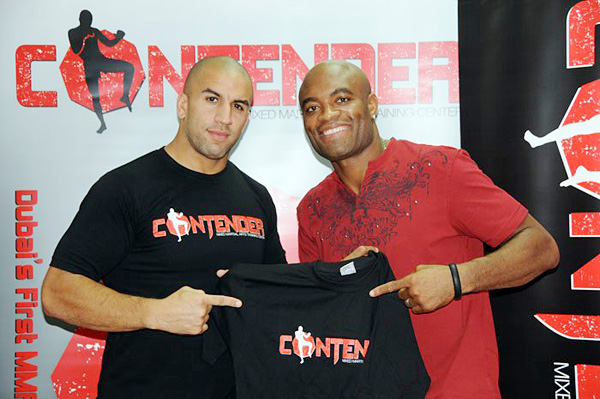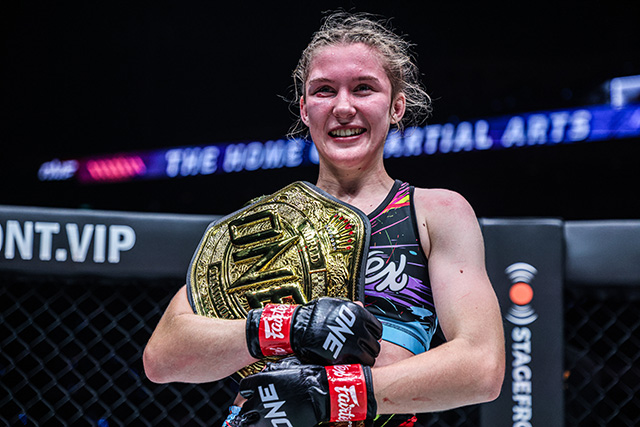Blazing a Trail in the Middle East

Tam
Khan, left, and UFC middleweight champion Anderson Silva.
DUBAI, United Arab Emirates -- The Middle East is not the first place one expects to stumble across a UFC fighter and self-confessed “white-trash jiu-jitsu” specialist, but Tim Credeur’s recent visit to the United Arab Emirates was yet another example of MMA’s growing global appeal.
Credeur was in the country to promote the documentary “Fightville” -- which also features his protégé, UFC featherweight contender Dustin Poirier -- at the Abu Dhabi Film Festival, but he also made time to conduct a free seminar at Contender MMA in Dubai. The packed gym and queues for autographs afterwards added weight to the belief that the Middle East is fast becoming the latest part of the globe to catch MMA fever.
Advertisement
In many respects, Khan is a living embodiment of MMA’s increasingly universal appeal. A Brit of Afghan descent, he rejected the more traditional career route in law or medicine and has instead poured his heart and soul into his quest to blaze a trail for the sport.
The story of his route into MMA will be familiar to many, as it is
one played out all around the world, regardless of creed or
color.
Khan was born in London but moved to the nearby county of Essex as a youngster. His family lived in an area with few ethnic minorities, and his mother, concerned he would be bullied, encouraged him to get involved in karate and amateur boxing for self-defense. He was also a promising soccer player and amateur body builder. However, a seminal moment came when he read a magazine article about the Gracie brothers and found himself transfixed. He and some friends ordered videos of the brothers in action and spent hours attempting to perform similar moves. Then, in 2000, Khan began studying under Daniel Burzotta, a renowned judo player who had travelled from the United Kingdom to Los Angeles to train in Brazilian jiu-jitsu with the Gracies.
“It was proper old-school training,” Khan says. “We were in a small church hall on judo mats -- no heating, no music. It was just five or six of us, and I was about 105 kilograms at the time but was getting constantly tapped out by a guy who was around 65 kilograms. It was driving me crazy, but I just fell in love with it and was soon training as often as I could.”
After entering some amateur competitions, Khan dove into the professional arena in 2005 at a time when MMA was starting to explode in the UK; he won his first fight by technical knockout. However, the defining moment in his MMA life ended up coming outside the cage, during a 2008 vacation to Dubai. The Middle East is oftentimes perceived as a permanent warzone home only to Islamic fundamentalists, but, in reality, this is a wildly inaccurate stereotype that ignores the diversity and complexity of the region. The UAE takes those prejudiced views and shatters them.
Though it has only been in existence for 40 years, the country has, in the views of many, become a shining beacon of hope in the region, thanks to its blend of liberal Islamic values and Western-style entrepreneurialism. The capital, Abu Dhabi, has already played host to an Ultimate Fighting Championship event -- UFC 112 -- after a company operated by the royal family invested in Zuffa LLC, parent company of the UFC.
Dubai, the second city of the UAE, is regarded as the Las Vegas of the Middle East. It is home to the world’s largest tower, the Burj Khalifa, the world’s largest shopping mall, Dubai Mall, and home to some of the most luxurious hotels on the planet. While New York is held up as the world’s ultimate melting pot, Dubai can put in a serious challenge for that title, with more than 150 nationalities working and living side-by-side in a harmonious, virtually crime-free environment.
“When I came to Dubai in 2008, the place was booming, yet they hadn’t even heard of MMA; I couldn’t believe it,” Khan says. “When I got back to the UK, I was back to a boring job; it was gloomy, raining and just generally depressing, so I decided to take a leap of faith. I decided I was going to move to Dubai to try and get MMA established, so I booked my ticket and never looked back.”
Khan started taking classes in an established traditional martial arts school, but, before long, he was struggling to keep up with the demand. A Royce Gracie seminar he staged in late 2008 could have sold out twice over and made him realize his belief in the potential was accurate. His rapidly growing private client base, including members of the royal family, was another key indicator. Soon, Khan began working with two local investors, and, in October 2010, the first stage of his dream was realized as Contender MMA opened its doors to the public in spectacular fashion, hosting a Wanderlei Silva seminar.
“I wanted everyone to feel welcome and not intimidated,” Khan says, pointing to the name of the gym, “and the reality is that, while not everyone can be a champion, everyone can be a contender.”
In the months since, Contender MMA has established itself as the home of mixed martial arts in the Middle East. Its fraternity of coaches, fighters and students is indicative of Dubai’s diversity, with a boxing coach from Cameroon, wrestlers from Russia, students from places such as the United States, Lebanon and India, and even drop-ins from U.S. servicemen on leave from stints in Iraq and Afghanistan. Celebrities who have been through the doors include Jean Claude Van Damme, and classes have also expanded to include everything from strength and conditioning to Capoeira.
“What Contender proves is that MMA is a uniting force: we welcome anyone here, regardless of nationality, religion or politics,” Khan says. “I love America, as it’s not only the home of MMA, [but] it’s also a country that historically has opened its arms to people from around the world on the condition they respect the country’s values and traditions. In the same way, the only thing I insist on at Contender is that everyone displays a level of mutual respect. I don’t care how talented you are, if you don’t display that respect, you’ve got no place here.”
In terms of his fighters, Khan has high hopes for Malik Omarov, from the Russian republic of Dagestan. Omarov, who is 24, has a strong background in Thai boxing and has impressed visitors like UFC middleweight champion Anderson Silva with his striking skills. Khan also takes pride in how Ari Basti, an Australian of Iranian origin, is developing at semi-pro level.
However, one of the major challenges facing Khan is finding matches for his fighters, given the lack of promotions in the region and the headaches of travelling abroad to compete. As such, it is hardly surprising that one of his future goals is to establish a promotional arm and to start running small shows to help regional fighters develop and grow awareness for the Contender brand.
In terms of his own influences, Khan singles out a number of individuals. His original mentor, Dan Burzotta, figures prominently, as does Dan’s brother, Alex, owner of the British promotion Ultimate Warrior Challenge; he serves as Khan’s manager. Khan regards Gracie as a “father figure” and remains eternally grateful for the UFC hall of famer’s support and guidance during his Dubai adventure. Khan credits White for MMA’s global growth and aims to someday work with the UFC boss.
“I really admire Dana White and the job he’s done in transforming MMA,” he says. “I just love his whole ethos and the way he does things: no [bulls---]. I just hope that one day we get the chance to help out when [the] UFC comes back here, as I’d love to get a local fighter on the card.”
Of course, the past few years have not been entirely smooth sailing. In particular, there has been the difficult process of education, both in terms of making the wider public aware of what MMA actually is and in terms of making new students realize they are not going to be UFC stars within months. Khan’s parting shot indicates how MMA has become a sort of global brotherhood.
“Our doors are open to all, whether it’s fighters interested in setting up camp here like they do in Brazil and Thailand, or whether it’s just people passing through who want to enjoy a training session,” he says. “We’re all in this together.”







